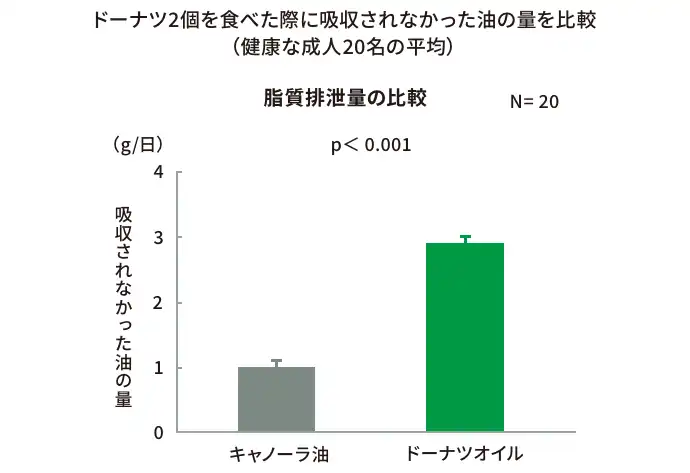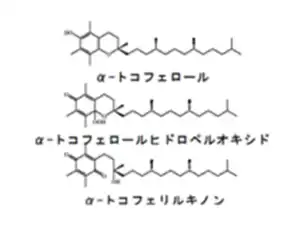Technology Development
We are studying food science, focusing on oils and starches, in order to create new value in terms of taste, health, and low impact. We are also working on developing new materials with a view to solving problems faced by our customers and society.
Fundamental Technology
Eliminates oiliness
If you feel an oily taste or smell in your mouth, the deliciousness of food is halved. Our unique technology suppresses the production and action of the compounds that cause oiliness and oily smell, achieving a "non-oily" texture and flavor, and we are working to eliminate the oily taste by researching and developing oils that are suited to foods.
Effect of frying oil on doughnut characteristics
We identified the important factors in the deliciousness and tearing (oil staining) of donuts and investigated the frying oil suitable for donuts. After evaluating various frying oils, we found that the melting point of the frying oil is related to the amount of oil staining in donuts, and the solid fat content at 30°C is related to the oiliness and dry texture. We found that oils with a melting point of approximately 40°C or higher and a solid fat content of about 20% at 30°C are suitable for donuts in terms of physical properties and sensory characteristics.
Furthermore, when the absorbability of an oil with the above characteristics was evaluated in humans, it was revealed that it was less absorbed into the body than canola oil (liquid oil).
(Journal of the Japanese Society for Food Science and Technology 61, 346-352, 2014)

Improving health value
Research findings (e.g., research into vitamin K2 intake)
What is Vitamin K2 (Menaquinone-7)?
Vitamin K was originally discovered as an essential vitamin for maintaining blood clotting, but in recent years it has been discovered to play a variety of roles in the body. In particular, it is becoming increasingly important as an essential component for maintaining bone health. The main forms of vitamin K that can be obtained from food are vitamin K1, found in green vegetables, and vitamin K2 (menaquinone-7), which is found in large amounts in natto.
Many people believe that calcium is essential for healthy bones, but even if you try hard to ingest calcium alone, it will not reach your bones. This is because the calcium you ingest must be transported to the bones and make the bone-building protein (osteocalcin) work properly. Vitamin K is the only vitamin that can activate this bone-building protein.
Clarification of effective dosage
It was known that vitamin K2 activates osteocalcin and is beneficial for bone health, but it was not clear what the minimum amount needed to be effective was. Therefore, with the cooperation of Japanese volunteers, we conducted a study to clarify this question. We found that taking 100μg of vitamin K2 (menaquinone-7) every day in addition to a normal diet can maintain the function of bone-building proteins and maintain and improve bone health. (Journal of Nutritional Science and Vitaminology Vol. 61 (2015) No. 6 p. 471-480. We at J-Oil Mills were the first to conduct detailed research on Japanese people.)
In Japan, where the population is aging, bone fractures due to osteoporosis are one of the main causes of bedriddenness. We would like to raise awareness of the importance of proactively taking vitamin K2 to maintain and improve bone health, and contribute to maintaining health through diet.
Research and development on safety and security (e.g. trans fatty acids)
In recent years, with the rise in health consciousness and the accumulation of scientific knowledge, information on lipids has become an important indicator for customers when selecting foods. Trans fatty acids are one of the lipid-related hazards, and in order to provide our customers with even greater peace of mind and safety, we are continually working to reduce trans fatty acids, which is also a guideline set by the government and industry groups.
Margarines are generally considered to be foods that contain a lot of trans-fatty acids, but we are working to reduce trans-fatty acids while maintaining the functionality of margarines (easy to spread, deliciousness) by developing and combining oils and fats that are the raw materials for margarines, and by utilizing our unique emulsification technology. In addition to margarines, we are also working on reviewing raw materials, developing new materials, and optimizing production conditions for other products, striving to reduce trans-fatty acids so that we can contribute to further customer peace of mind.
Collaboration both inside and outside the company
In order to create new value, in addition to our own research, we actively conduct collaborative research with universities and other research institutions.
Since April 2019, we have been running a joint research course on the oxidation of edible oils with the Graduate School of Agricultural Science at Tohoku University (J-Oil Mills Oil and Fats Innovation Joint Research Course).
In this joint research course,
- To understand the components produced by various oxidation reactions of fats and oils by establishing new analytical techniques for lipid peroxides produced by the oxidation of fats and oils and the secondary oxidation products that result from them.
- To understand the key points of events that occur during oxidation, clarify the points that should be controlled, and explore new application possibilities for fats and oils.
is our main objective.
As a result of their research to date, the joint team has developed several methods for detailed analysis of oxidized fats and oils, and has succeeded in understanding the complex reactions to a certain extent. Going forward, they will further elucidate the oxidation mechanism and the properties of the oxides, aiming to establish and strengthen oxidation control technology.
By deepening our joint research with Tohoku University, we hope to unlock the potential of edible oils and fats and further contribute to "reducing environmental impact" and "preserving food resources," two issues that we position as important.
In addition to applying the technologies we develop in a timely manner to our products, we also output our findings in the form of academic conferences and research papers, thereby contributing to technological advances throughout society.
Analysis of oxides in fats and oils
Fats and oils contain various antioxidants, but it is difficult to understand their behavior. In this study, we succeeded in establishing a method for analyzing trace amounts of tocopherol hydroperoxide and tocopheryl quinone, which are produced by the oxidation of tocopherol (vitamin E), a typical antioxidant found in fats and oils, using a tandem quadrupole mass spectrometer.
This research has enabled us to understand the behavior of antioxidants in fats and oils, which had not previously been understood in detail, and we believe that this will provide important insight into understanding and controlling lipid oxidation.

Title: Analysis of oxidation products of a-tocopherol in extra virgin olive oil using liquid chromatography-tandem mass spectrometry.
Authors: Rena Tanno, Shunji Kato, Naoki Shimizu, Junya Ito, Shuntaro Sato, Yusuke Ogura, Masayoshi Sakaino, Takashi Sano, Takahiro Eitsuka, Shigefumi Kuwahara, Teruo Miyazawa, Kiyotaka Nakagawa
Published in: Food Chemistry 306 (2020) 1 25582 DOI: https://doi.org /10.1016/j.foodchem.2019.125582
Intellectual Property Initiatives
Intellectual property initiatives are essential to our pursuit of "Delicious Design®"and bringing happiness to our customers.
J-Oil Mills regards intellectual property activities as essential to its business activities. We have established a specialized intellectual property organization within our research and development division to proactively promote the acquisition of rights, and will respond appropriately to any infringement of our rights by third parties in accordance with the relevant laws and regulations.
At the same time, we will make every effort to respect the intellectual property of third parties so as not to infringe on their rights.
At J-Oil Mills, we position the strategic protection of our proprietary technologies as an important operational goal of our research and development department, and the number of patent applications has increased 1.5-fold over the past five years.
- 1. Protection of our technology through intellectual property rights
- We actively file patent applications for inventions obtained through research and development, as well as inventions that are important to our business strategy, with the aim of obtaining rights. To that end, we participate in regular meetings of the technology development organization to discover new inventions.
- 2. Support for formulating intellectual property strategies and business/research strategies
- We use patent maps to collect, analyze, and evaluate patent information, and provide support for developing intellectual property strategies as well as business and research strategies.
- 3. Preventing the risk of infringing other companies' rights
- We conduct investigations before the release of products in an effort to prevent infringement of other companies' copyrights.
- 4. Education and awareness raising regarding intellectual property rights
- We provide introductory patent courses via e-learning to employees in their first or second year in the technology development organization, and patent study sessions on specific themes for mid-level employees. We also encourage active participation in external patent courses to promote education and raise awareness regarding intellectual property rights.
